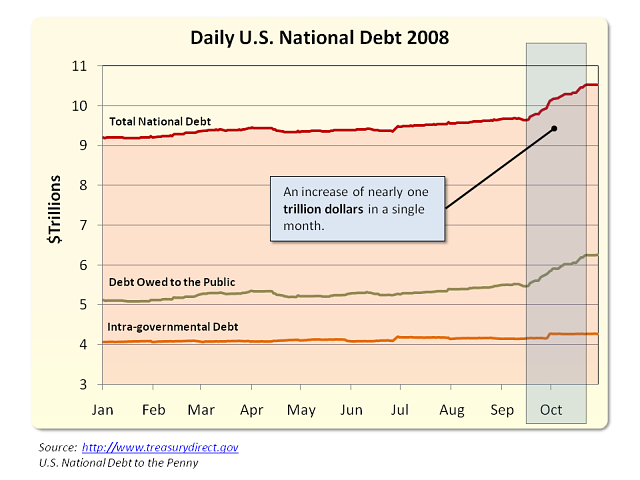Ross Perot, you will remember, made the federal budget deficit one of the major centerpieces of his 1992 campaign for president. He received 19% of the vote. That's not an insignificant showing for an independent candidate. Perot's personal wealth is not insignificant either. His personal budget deficit is decidedly in the black. He sold his company to General Motors in 1984 for $2.5 billion. Last month, the second company with which he has been involved, Perot Systems, was sold to Dell Computer. According to reports, the sale could net the Perot family another $954 million.
At any rate, I discovered that despite business distractions, Perot is still with us on the political front. He continues to focus squarely on his old nemesis, the deficit.
Check out the "Perot Charts" Web site, which focuses primarily on the types of charts he made famous in his 1992 campaign. (Albeit today with fancy computer graphics instead of the cardboard charts he used to point to in his famous TV commercials.) One of the primary focal points on the site is the deficit, or, as Perot calls it, "the enormous national debt." He points out that we are leaving this for our children and grandchildren to deal with.
Here's a screen shot of one of his charts.

I bring this up because
The New York Times recently
reported the following: "Faced with anxiety in financial markets about the huge federal deficit and the potential for it to become an electoral liability for Democrats, the White House and Congressional leaders are weighing options for narrowing the gap, including a bipartisan commission that could force tax increases and spending cuts."
In other words, it's not just Perot fighting a quixotic, lonely war on the deficit battlefield these days. Others are getting antsy about the issue. So much so, according to the report, that Democratic leaders are trying to head it off at the pass as a campaign issue.
How much of a priority is the deficit to the American public? Mixed feedback. Gallup's open-ended "
most important problem" question last month showed that only 5% of Americans spontaneously mentioned the deficit as the country's top problem. It was dwarfed by the economy, jobs, healthcare, and the government more generally. (9% mentioned the deficit in September; back in January 1996, 26% mentioned it as the nation's top problem.)
The deficit makes a stronger showing when it is mentioned specifically to respondents in a list.
A recent
Gallup/USA Today poll gave Americans five issues and asked which one should be Barack Obama's top priority as president. The federal deficit was one of a group of three issues that received roughly the same 14% to 18% of choices (along with healthcare and the wars in Afghanistan and Iraq). The economy won, and virtually no one mentioned energy.
In a September
NBC News/Wall Street Journal poll, the deficit was third in a list of seven issues, behind only healthcare and the jobs/employment. The deficit was chosen more frequently than energy/cost of gas, the wars in Afghanistan and Iraq, and values issues such as abortion and same-sex marriage. A
September Bloomberg poll also showed the deficit coming in behind healthcare and the economy.
To some degree, it appears, the budget deficit is a latent issue with the public. Maybe not top of mind, but a concern when brought up.
The size of the budget is mathematically related to the level of government spending and tax revenue. It seems pretty clear that to "reduce the deficit," one must spend less or bring in more revenue. Tax revenue can boom if the economy booms, as happened in the late 1990s, when there was no deficit at all for
one brief, shining moment. Or, of course, tax rates can be increased.
At the moment, rather than a reduction in government spending, the path appears to be one of an increase in spending. By doing nothing, the ongoing juggernaut of entitlement spending through the Social Security and Medicare programs will also ensure that government spending increases. No immediate signs of budget deficit relief there.
Reducing the deficit is generally an unpleasant task for the government if it involves raising taxes or reducing spending. The
Times article puts it thusly: "There is no indication that more liberal Democrats have any appetite for deep spending cuts or further tax increases in the coming year as the party battles to maintain its majorities in the House and Senate in the 2010 midterm elections."
Americans certainly will agree with the idea of raising taxes on the rich. But otherwise Americans would indeed probably frown on the idea of "further tax increases." And government spending is already a significant
concern to Americans.
Hence the idea to form a commission to study the idea, which to some degree "turf's" (see
here) the issue. Commissions sometimes
work as a way to accomplish politically unpleasant tasks. And sometimes they don't.
Ross Perot would be
81 if he were to begin to campaign for the presidency in January 2012. This would appear to be an unlikely course of events. So the deficit will be an issue in the forthcoming presidential election for Obama and his Republican challenger to deal with.
Obama himself does not get great marks on the deficit. Just 31% in a recent Gallup poll say he will be able to control federal spending.
Is there an opening for the Republicans here if the Democrats don't manage to get a political handle on the situation through a commission or some other way? Unclear. Republicans are certainly making it a centerpiece of their current positioning. But the
deficit soared under George W. Bush, which makes it harder to argue that reducing the deficit is a Republican signature strength.

